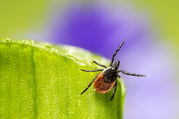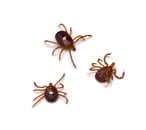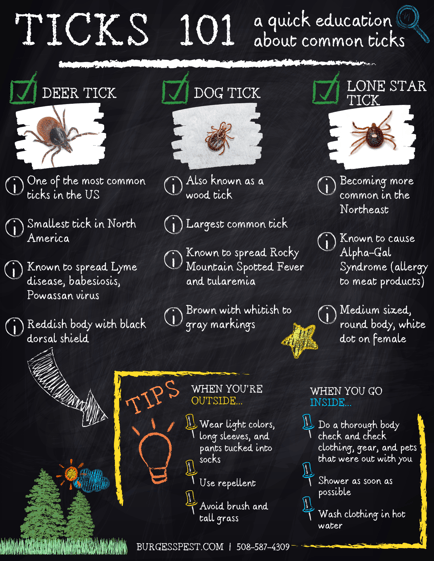If you've spent any amount of time outdoors in New England. you're probably familiar with ticks. Although these tiny arachnids are becoming a year-round problem, we are currently in the midst of prime tick season. Check out the infographic below to learn about ticks in Massachusetts.
 Deer Tick: Also known as the black-legged tick, this is one of the most common ticks in the United States. Despite being the smallest tick in North America, they pack a big punch when it comes to spreading diseases like Lyme disease, babesiosis, and Powassan virus. They can be identified by their reddish body and black dorsal shield.
Deer Tick: Also known as the black-legged tick, this is one of the most common ticks in the United States. Despite being the smallest tick in North America, they pack a big punch when it comes to spreading diseases like Lyme disease, babesiosis, and Powassan virus. They can be identified by their reddish body and black dorsal shield.
Dog Tick: The dog tick is also called the wood tick and is known as the largest tick species. They are responsible for spreading Rocky Mountain Spotted Fever and tularemia and are distinguished by whitish or gray markings on the body.
 Lone Star Tick: The lone star tick has recently made its way to our area from the southeast region. True to its name, the female lone star can be identified by the white dot on its dorsal shield; males do not have the trademark white dot, but share the round body shape and reddish-brown color. This tick is known to transmit STARI (Southern Tick-Associated Rash Illness) and to cause Alpha-Gal Syndrome, an allergy to red meat and other animal products.
Lone Star Tick: The lone star tick has recently made its way to our area from the southeast region. True to its name, the female lone star can be identified by the white dot on its dorsal shield; males do not have the trademark white dot, but share the round body shape and reddish-brown color. This tick is known to transmit STARI (Southern Tick-Associated Rash Illness) and to cause Alpha-Gal Syndrome, an allergy to red meat and other animal products.
 To reduce your risk of tick-borne diseases, bite prevention is key when spending time outdoors:
To reduce your risk of tick-borne diseases, bite prevention is key when spending time outdoors:
- Wear long sleeves and pants, tucked into tall socks if possible. Opt for light colors to make ticks easier to spot.
- Use EPA-approved repellents and consult your veterinarian for the best options for pets.
- Avoid brush and tall grass; stick to the center of trails when hiking.
- Perform thorough body checks and check your outdoor gear and any pets that go outside with you.
- Shower and change clothes as soon as possible after time outdoors.
- Wash clothes in hot water.
 If you do find that you have been bitten, know how to safely remove the tick and do so as soon as possible to lower the chances of disease transmission - but be sure to watch for symptoms such as fever, rash, fatigue, muscle aches, joint pain, headache, or loss of appetite, and consult your physician should they arise.
If you do find that you have been bitten, know how to safely remove the tick and do so as soon as possible to lower the chances of disease transmission - but be sure to watch for symptoms such as fever, rash, fatigue, muscle aches, joint pain, headache, or loss of appetite, and consult your physician should they arise.
Long story short, ticks are a serious concern in our part of the country, and bite prevention should be taken seriously. In addition to taking your own precautions, call the experts at Burgess Pest for extra protection on your property. The best Massachusetts tick control starts at just $49/month - request a free estimate today!



